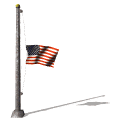![]()
 |
|
 |
![]()
 Bayless killed in Battle of Tarawa
Bayless killed in Battle of Tarawa
Joseph W. Bayless, Farmington (deceased) served in the U.S.
Marine Corps as a Staff Sergeant with the H&D Company, 2nd Amphibian Tractor
Battalion, 2nd Marine Division.
Irene Bayless wrote the following on Joe (1919-1943):
"Joe grew up on a farm near Farmington. When he joined the Marine Corps, he was assigned to
the Amphibian Tractor Training Station in Dunedin, Fla.
"The Amphibian Tractors were invented by a man in
Clearwater, Fla. We had a bad hurricane that
killed lots of people because rescue could not reach them due to heavy flooding and high
winds. He said he would make a vehicle that
would go anywhere, like an alligator.
"I met Joe at a dance, held every Saturday evening at
the Community Center in my hometown, Largo, Fla. (Clearwater and Largo were just south of
the training station). A neighbor of mine was
one of the sponsors of the dance and she always said she got Joe and me together.
"When the war started, the Marines were transferred to
San Diego. Joe learned he would stay there for
a while so he sent for me to join him in San Diego. The
people of the area were opening their homes to servicemen and their families.
"The couple we stayed with had three under-school-age
children. I took care of their children and
did the cooking for our room and board. The
lady of the house went to work at the airplane plant.
"Later, we were joined by a friend of mine (another
Marine and Largo girl). Three families in a
small two bedroom house. Though we were
cramped, we lived like one big family and believe it or not there was no bickering, just
happy to be together as long as possible. Other
homes were even more crowded than ours, anywhere a bed or cot could be placed.
"The war was on for nearly a year when Joe's turn came
to go overseas. Our daughter was two months
old at the time. He went to New Zealand and he
was there almost a year before going into battle at Tarawa.
He was assigned a new version of the Alligator, called the Buffalo. It was supposed to be larger and better fortified.
"Joe's Captain told me he saw him the last time at the
ship around noon of that first day of the battle. He
had already made several trips to take supplies for the men reaching the beach. Joe said to the Captain 'It is really bad out there
and we are losing an awful lot of men.'
"Joe reached the shore the time he took a direct hit and
his men buried him in a shallow grave to prevent his body from going back out to sea. To make the battle worse that horrible day the Navy
Higgins boats got stuck on the coral reefs and the Amphibians had to shuttle from the
Higgins to wading distance from shore to get enough men on shore to hold the line. It took four days to secure the island.
"Joe was declared missing for some time then I received
word they were sure he was dead. They had not
located his body but placed a marker in the cemetery set up on the island. I left San Diego and went first to his family in
Missouri for a few months, then back go Largo. Seven
years later, I was notified Joe's body had been identified by his teeth after sifting
sands on the island. They recommended burial
at the National Memorial Cemetery of the Pacific, Honolulu. And I agreed.
"Our daughter grew up in Largo, is an RN and married. From the marriage of Joe and I came a daughter, two
grand children and three great grand children also two step great grand children, a loving
family and we get together often.
"In 1987, my daughter and I finally were able to go to
Hawaii to visit the cemetery and Joe's grave. It
is a very impressive place. On Memorial Day
each year a special service is held and the children of the schools in Honolulu march in
with Orchids to place on each grave. The
natives call the cemetery Puowina Miaus, Hill of Sacrifice."
The DAILY JOURNAL, St. Francois County., Wednesday, April 26, 1995.
The information on this site is provided free for the purpose of researching your genealogy. This material may be freely used by non-commercial entities, for your own research. The information contained in this site may not be copied to any other site without written "snail-mail" permission. If you wish to have a copy of a donor's material, you must have their permission. All information found on these pages is under copyright of Oklahoma Cemeteries. This is to protect any and all information donated. The original submitter or source of the information will retain their copyright. Unless otherwise stated, any donated material is given to MOGenWeb to make it available online.